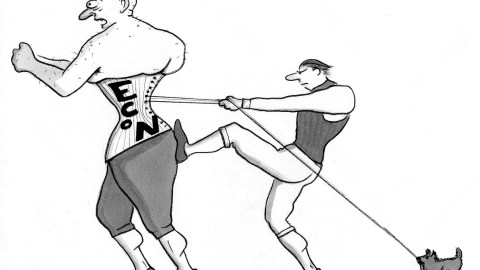Adam Smith Was A Behavioral Economist And No Fan of Greed

Adam Smith was no fan of greed. And Smith fans who hold selfishness a virtue distort what he called his best work.
1. “Adam Smith was a behavioral economist,” says Richard Thaler (noted Misbehaving adder of empirical psychology to economics).
2. Smith got famous first for what we’d now call psychology. Edmund Burke called The Theory of Moral Sentiments “fittest to explain those natural movements of the mind… which every Science relating to our Nature” needed (commending Smith’s “illustrations from common Life“).
3. Smith begins Sentiments by observing that “the virtuous” have no monopoly on sympathy—“the most hardened violator of… laws” has sympathies. Even the “greatest ruffian,” however selfish, “evidently [has] some principles in his nature which interest him in the fortunes of others, and render their happiness necessary.”
4. Sentiments “entranced a public caught up in the cult of sensibility and virtue” (virtue—>logical life skills).
5. Smith had a lifelong preoccupation with virtues and their connection with republicanism ( = rule for the “public good” ≠ sum of private interests).
6. Smith’s approved virtues required the rule of “prudence, of strict justice, and of proper benevolence.” Plus self-command of passions. (Note: self-command—>deeply adaptive in human evolution.)
7. Smith’s now more famous book, The Wealth of Nations (WoN, 1776), is a founding document of economics. But it is no “greed is good” free-market “Bible of Capitalism.” Consider a few “surprising” quotes:
8. Because businesses “have generally an interest to deceive and even oppress the public,” they often “conspire” accordingly.
9. Because of their “mean rapacity… merchants and manufacturers.. neither are nor ought to be the rulers of mankind.” Smith feared greed in unfettered markets.
10. “When… regulation… is in favor of the workmen, it is always just.”
11. “Every tax… is to the person who pays it a badge… of liberty. It denotes that he is subject to government.” (Liberty requires government—>can’t be secured privately.)
12. Smith’s “public good” republicanism is baked into America’s founding documents (e.g. Jefferson held to Smith’s Scottish Enlightenment sensibility).
13. The “Declaration’s” first listed justification for Independence is America’s need to enact “Laws… necessary for the public good.” The Constitution specifies government’s duty to “promote the general Welfare” (listed right after “provide for the common defense”).
14. Smith would likely be horrified by any republic ruled by rapacious free-market interests (today seemingly lacking the sympathies of Smith’s “greatest ruffians”).
15. Thaler says all economics was behavioural until the 1940s. After that all human behaviours were filtered, fitted, and squeezed into the formulation Economics = Optimization + Equilibrium.
16. But such cartoon selfish optimizing behaviours are neither “natural movements of the mind” nor evident in “common Life.” Economics must return to its behavioural roots.
(17. Smith got the “invisible hand’ from Shakespeare. Sentiments long outsold WoN.)
—
Illustration by Julia Suits, The New Yorker Cartoonist & author of The Extraordinary Catalog of Peculiar Inventions.





